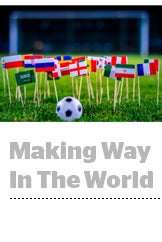 The 2018 World Cup has featured an exciting range of upsets and contenders, but some World Cup marketers see early signs of trouble thanks to GDPR throwing a wrench into digital advertising and the absence of the US team.
The 2018 World Cup has featured an exciting range of upsets and contenders, but some World Cup marketers see early signs of trouble thanks to GDPR throwing a wrench into digital advertising and the absence of the US team.
GDPR, which became law less than a month before the soccer tournament, is especially painful for World Cup sponsors because the law applies to European citizens abroad, so targeting French nationals in the United States or British fans in Australia is hazardous.
The World Cup is the first major test for brands running global campaigns and targeting EU audiences at scale around the world, said Jeff Greenfield, co-founder and COO of the attribution company C3 Metrics.
Major World Cup advertisers have their budgets in place months or a year ahead of time, but much of the data brands would normally apply is ineffective because publishers haven’t had time to update for GDPR or gather consent for targeting, said Matthew Watson, CEO of the sports video and advertising company SendtoNews.
“GDPR probably doesn’t affect the spend committed ahead of time by World Cup advertisers, but it has impacted implementation,” Watson said.
That’s good news for the walled gardens. US and Europeans brands in particular are spending more with platforms like Facebook, YouTube and Twitter that can accommodate targeting and less on mass-market, multichannel video campaigns, said George Pappachen, president of the digital media information provider BIScience.
But you can’t blame GDPR for everything, Pappachen said. Former World Cup sponsors like Johnson & Johnson and Castrol, a British motor oil company, dropped out following recent FIFA corruption scandals, and EU and US companies haven’t filled the vacuum in part because they don’t want the association with host nation Russia.
Fewer marketing dollars are at stake, though, with overall sponsorships for this World Cup down almost $200 million from the previous four-year cycle, according to Nielsen.
The US effect
The US team was never expected to contend for the World Cup title, but the team’s first absence from the tournament in more than 30 years does undercut consumer marketing potential.
World Cup brands are still running ads in the US but are targeting them to known fans on sport sites or social platforms instead of using broad campaigns meant to pick up new or casual fans, as was the case during the last World Cup in 2014, Pappachen said.
More than half of SendtoNews’ total World Cup engagement has come from videos for the Mexican team as English-speaking US audiences lose their zeal without the US in the field, Watson said.
Bleacher Report has also seen a big upswing of interest in reaching Latin American or Spanish-speaking audiences in the US, said CRO Howard Mittman.
Ten years ago, “it would have been a death sentence for the World Cup to lose the US team and market,” Mittman said, but now social and mobile channels can reach fans despite the US team’s absence on TV.
Fox Sports, which in 2011 paid $400 million for US broadcast rights for the 2018 and 2022 World Cups, is keenly aware of the issue. The first marketing partner Fox added after the US team was eliminated was the genetics company 23andMe, running a campaign called “Root for your roots,” encouraging fans to find a team from their heritage to support.
Fox Sports did not respond to a request for comment.
But just as Chinese brands like Wanda Group and Mengniu seized an opportunity to sponsor the World Cup after Western brands exited, the US team’s failure to qualify opened the door for latent players in the market.
The big winner in this World Cup, for instance, could be Telemundo, the official North American Spanish-language broadcaster.
The American team’s absence means the World Cup has more Spanish-speaking nations, and the NBC-owned network isn’t hamstrung by GDPR because it broadcasts in North America and targets more Central and South Americans instead of Europeans, said Laura Molen, EVP of NBCUniversal’s lifestyle and Hispanic ad sales group.
“We’d have loved to have the US in the World Cup,” Molen said, “but for Telemundo we’re lucky to avoid some of those other headaches” like GDPR or brand disinterest without the US team.














